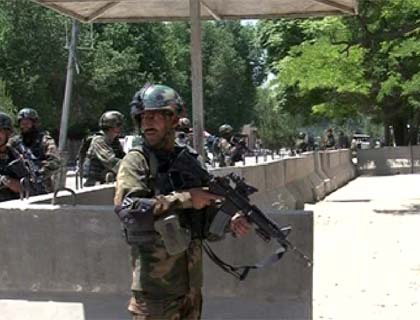KABUL - NATO will extend the length of its police training course across Afghanistan from October as it takes aim at staggeringly low literacy rates and corruption among the force before all security is handed over to the Afghans by the end of 2014.
The NATO-led alliance has been training members of the 126,000 strong Afghan National Police since 2009. Afghan police had long been viewed as inept and lagging behind the training of the army, which was the focus of foreign instruction efforts since U.S.-backed Afghan forces toppled the Taliban in 2001.
The task has become even more important as western forces prepare to begin handing over security, a transition U.S. President Barack Obama says will start from July when he plans to begin a gradual drawdown of U.S. troops.
The NATO run six-week training course for police will gain an extra two weeks in some parts of the country from July before the eight-week course is rolled out across Afghanistan from Oct. 1, answering a request from the Afghan government.
Trainers had complained the course aimed at forging a more professional officer class through teaching elementary combat and patrolling, was too short.
Security analysts have warned that efforts by NATO to produce quick results in training Afghan forces increase the risk of choosing "quantity over quality".
"No matter how good your police are, there is a minimum quantity that must be provided," said Canadian Navy Captain Angus Topshee director of NATO's police training operations in Afghanistan.
"Six weeks was deemed to be the bare minimum, we always wanted to increase it. If we sustain the security gains we have made, then we will increase it again," he told Reuters in an interview.
Police are often the only face of the government in many remote areas and a chronic lack of equipment makes them vulnerable to attack police have suffered much higher rates of casualties than the army.
The extended course means officers will receive 96 hours of literacy training and 268 hours of policing overall, putting their reading and writing at a U.S. third-grade level, when children are around 8 years old.
In an effort to stamp out the rampant corruption stemming from police usually working in their own neighborhoods leaving them open to bribes, their salaries are around $165 a month, on par with the army and considered reasonably high in Afghanistan.
Topshee said literacy currently running at 14 percent of the police force was NATO's top challenge in training.
"We have to make sure they can investigate reports and write traffic tickets," he said.
Other hurdles lie ahead, with "rogue" policemen posing a "great concern" despite a vigorous vetting and biometric process, Topshee said.
Efforts to train Afghan police have been complicated by a string of incidents over the past 18 months where Afghan police and soldiers or insurgents who have infiltrated security forces, have turned their weapons on their mentors.
Recruiting female police officers seen as vital in a country which adheres to strict Islamic codes where men and women are often separated is also posing difficult.
Currently numbering at around 1,000, Afghanistan wants 5,000 women in the police force by the time security is handed over to the Afghans in 2014.
"It is not a traditional role for women in Afghanistan and there are cultural challenges to overcome but they must search other women, and we must have female input for investigating domestic abuse cases," Topshee said. (Reuters)

